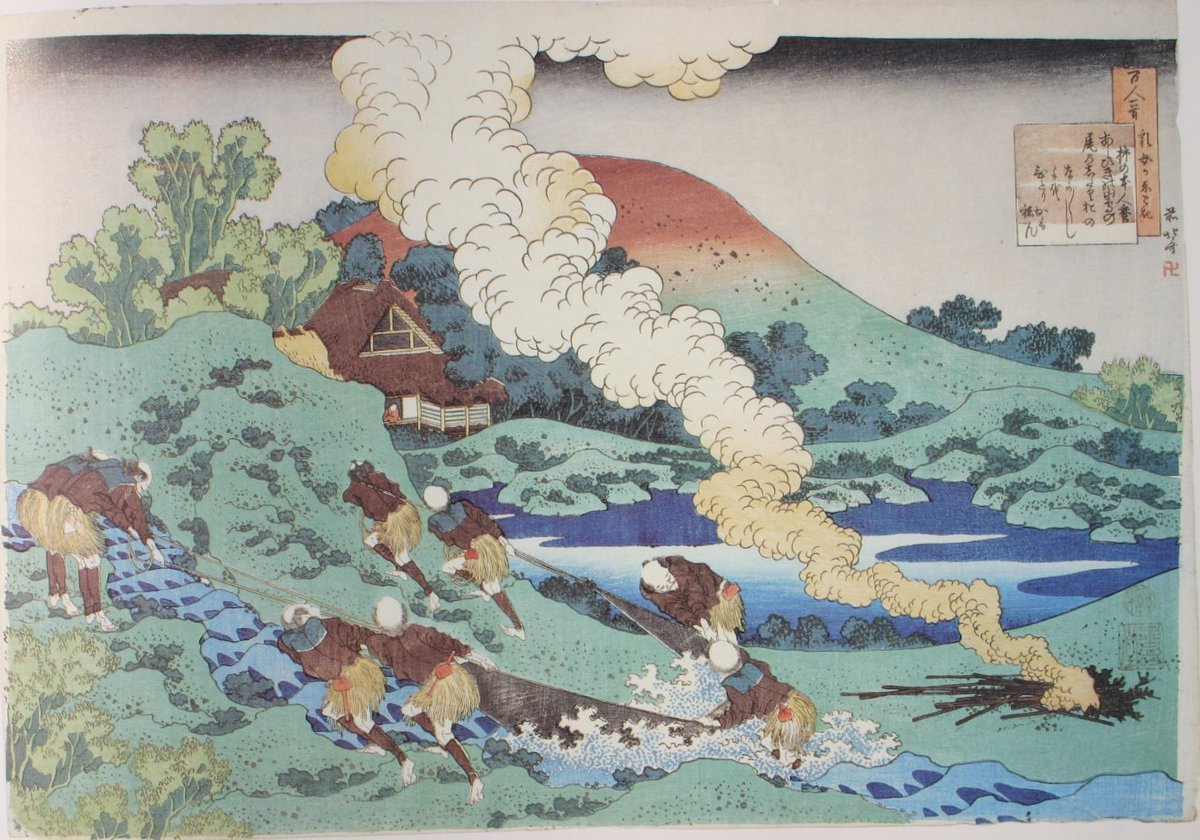Ogura Hyakunin Isshu 3
Kakinomoto no Hitomaro (660‒724 or c. 653×55 – c. 707×10)
A foot-dragging
mountain pheasant’s
tail-drooping tail’s
long-dragging length of night ‒
to sleep it alone?
/1
Kakinomoto no Hitomaro (660‒724 or c. 653×55 – c. 707×10)
A foot-dragging
mountain pheasant’s
tail-drooping tail’s
long-dragging length of night ‒
to sleep it alone?
/1
Kakinomoto no Hitomaro
Ashibiki no
Yamadori no o no
Shidari o no
Naganagashi yo o
Hitori ka mo nen
柿本人麿
あしびきの
山鳥の尾の
しだり尾の
ながながし夜を
ひとりかもねむ
/2
Ashibiki no
Yamadori no o no
Shidari o no
Naganagashi yo o
Hitori ka mo nen
柿本人麿
あしびきの
山鳥の尾の
しだり尾の
ながながし夜を
ひとりかもねむ
/2
3
Innocht ní·chotail in gerg.
Ós ḟráechaib anfaid imard
binn fogar a gotha glain.
Etir ṡrotha ní·chotail.
“The grouse does not sleep tonight.
High above the ragings of the storm
the sound of its clear voice is sweet.
Between the streams it does not sleep.”
/3
Innocht ní·chotail in gerg.
Ós ḟráechaib anfaid imard
binn fogar a gotha glain.
Etir ṡrotha ní·chotail.
“The grouse does not sleep tonight.
High above the ragings of the storm
the sound of its clear voice is sweet.
Between the streams it does not sleep.”
/3
Stanza 15 of Cotail becán becán bec a.k.a. Gráinne’s sleep-song for Diarmait
MS: UCD Franciscan MS A 20 (b) Duanaire Finn f. 45r
Image: @DIAS_ISOS
The full text: https://celt.ucc.ie/published/G400055/index.html
Translation: https://archive.org/details/duanairefinnbook07macnuoft/page/196/mode/2up
/4
MS: UCD Franciscan MS A 20 (b) Duanaire Finn f. 45r
Image: @DIAS_ISOS
The full text: https://celt.ucc.ie/published/G400055/index.html
Translation: https://archive.org/details/duanairefinnbook07macnuoft/page/196/mode/2up
/4
Although the Irish poem is well from the upper end of the time range of my series (c. 1150, late Middle Irish), I couldn't not pick it. Pheasants were not native to medieval Ireland, therefore I went for another vociferous bird: the grouse, from the same family...
/5
/5
...Phasianidae as the copper pheasant, albeit without such a conspicuous drooping tail. I follow @edil_dictionary’s suggestion “grouse” for gerg, but Murphy (Duan. Finn iii 274) translates it as “curlew”, and has a long discussion why.
I try to stay as near to...
/6
I try to stay as near to...
/6
...the original lines as possible in my translation, but the different word orders ‒ SOV in Jap., VSO in OIr., SVO in Engl. ‒ and the different strategies of adjoining phrases push the limits of translation at time. Here, the neverending concatenation of dependent phrases...
/7
/7
...in Japanese (as drawn-out as the night) results in something that crosses the border of intelligibility when imitated closely in English. Still, give it a try & figure out what is meant by the poet.
Although the Irish stanza only speaks about a grouse, for the...
/8
Although the Irish stanza only speaks about a grouse, for the...
/8
...understanding of the whole poem it is central to know that this is a lullaby for a man who cannot find sleep, like in the Japanese poem. But it is not the longing for his love that keeps him awake, but fear for his life, since he has eloped with the woman destined...
/9
/9
...for the leader of his band. It is she who sings the sleeping song for him. This stanza is a perfect illustration that Irish too is capable of double entendre: fráech in line b can mean “heather” and “fury, rage”, both make sense here.
Hokusai is generous with his puns.
/10
Hokusai is generous with his puns.
/10
He makes fun of the formulaic word ashibiki “foot-dragging (mountain)” and of naganagashi “long-dragging (night)” which are echoed in the “dragnet” hikiami and the “driftnet” nagashiami that the fishers drag up the hill. The long tail of the pheasant...
/11
/11
...is transformed into a long trail of smoke. In the background, we also see the poet alone in a hut, exactly in the vanishing point of the perspective projection, totally oblivious of the world around him in his self-pitying sleeplessness.
/12
/12
Finally, “sleep” and “tonight” bring another animal to mind that… actually isn’t sleeping either, at least not in the original version of the song Mbube by Solomon Linda! (Neither do lions sleep at night, nor do they live in the jungle.)
/13
/13

 Read on Twitter
Read on Twitter



